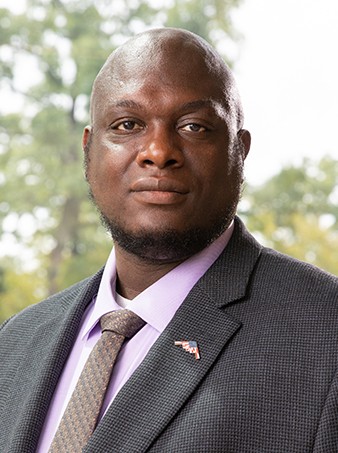Coby Dillard - "I always enjoy the moments where I can have a student in my office and help them with whatever they need."
Coby Dillard is the Director of Military and Veterans Affairs at UT Tyler

A Navy veteran, Coby is a higher education administrator whose work and research focuses on military-related students, and their transition in and through the academic community. He has written and presented on ways that educational institutions can improve their support services for this unique student population.
I pretty much walked into higher ed from the street! I was unemployed in 2010, so I decided to go to my local community college (Tidewater CC in Norfolk, VA) to get my degree. While going through the enrollment process, the supervisor of the VA office mentioned the VA’s Work-Study Program to me, and it sounded interesting since it aligned with my military background. I started working in April 2020 and started class in May 2010…and the rest is history!
For all the things that we do right in supporting our military affiliated students across the nation, there’s still a lot that we’re learning or just don’t know yet. We’re still trying to break away from a focus on just getting students in and certified, without a lot of regard on how they’re performing academically and how their life outside of school affects their academics. We’re still arguing over military credits and how we can leverage them to help with degree completion.
I lean a lot on my experiences, especially mistakes I made as a student veteran. I had the advantage of working while I was in school, so I learned a lot of the rules regarding benefits and was able to pass on this knowledge to my fellow student veterans. Beyond that…I spend a lot of time talking to my student veterans about the importance of the “little things” that all of us veterans need to be reminded of; things as small as “please stop carrying around your original DD-214” to larger things such as “yes, you should absolutely look into your disability rating with the VA, regardless of what you’ve heard about them.” With our dependent students, there’s a larger focus on making them feel welcomed as part of the community, as they can often fly under the radar until it’s time to get their benefits going again.
My experience was pretty good! I attended three institutions: Tidewater Community College, Norfolk State University, and Regent University (all in the Hampton Roads area of VA). At Tidewater, I was the SGA president for my campus in 2011-12, and also the vice president of what was the Military and Veteran Students Association (now SVA). My senior thesis at Norfolk State focused on academic advising models for student veterans, and that was when I figured out that I would be working in higher ed for a while!
Lots of frustrations…first, the transition from service member to veteran comes with its own set of challenges, and we’re adding to that the challenges of entering a college or university. Second, we're bringing these students into institutions that may not fully understand what our veterans bring to the table, and how some of their experiences can be leveraged for degree completion. Also, the VA changes its rules all the time, which can lead to nervousness and confusion on "what's the right thing to do?"
My transition from being really student-facing to now being the person making the decisions. I still interact with students often, but my job now is more administrative: figuring out or creating policies and procedures, meetings, donor relations, etc. Necessary items to be sure, but I always enjoy the moments where I can have a student in my office and help them with whatever they need.
One of the things that I hope for is an accreditation for military affiliated student centers on campus. One size doesn't fit all, but there are certain minimal standards (staffing, financial commitment, space, etc.) that an institution should be required to meet...otherwise, we end up with a lot a "spaces" for our students that affirm the institution, but are largely ineffective for the students we support.
When I got my first full-time role, I attended an event where we had to write down some words of wisdom as tree leaves for a display. I wrote on mine, "find out what you're good at, and work to excel at it...and then help others do the same." Put in the difficult, but necessary, work to excel at what you do, and as you're doing that, help others to find that same purpose.
